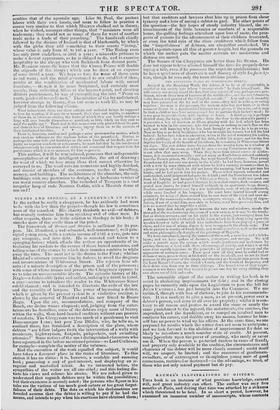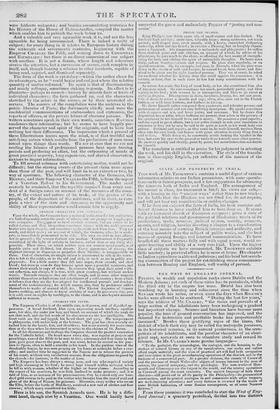RAUMER'S ILLUSTRATIONS OF HISTORY.
THIS book is an instance of what previous knowledge, earnest will, and great industry can effect. The author was only five months at Paris, and during that time was attacked by a sickness which threatened to be fatal. In so short a period, however, he examined an immense number of manuscripts, whose contents •
were hitherto unknown ; Ind besides accumulating materials for his History of the House of Ilohenstautfen, compiled the matter which enables him to publish the work before us.
And a valuable and very agreeable work it is, and not the less agreeable fur being unconnected. There is indeed a unity of subject ; for every thing in it relates to European history during the sixteenth and seventeenth centuries, beginning with the Emperor CHARLES the Fifth, and coming down to CROMWELL and RICHELIEU : but there is no direct connexion of one subject with another. It is not a drama, whose length and coherence strains the attention, but a succession of scenes, each complete in itself, and, though bearing a relation to other incidents, capable of being read, enjoyed, and dismissed separately.
The form of the work is epistolary—which the author chose for its advantages, as he " could begin and end just where the relative quantity of matter indicated." Its spirit is that of discriminating and manly colloquy, sometimes sinking to gossip. Its effect is to illustrate—perhaps to correct—history by minute facts or traits of individual characters; the facts gathered up, and the characters sketched by the actors in the scenes, or by their interested ob- servers. The sources of the compilation were the archives in the public libraries of Paris; the documents chiefly used were the confidential communications of ambassadors and statesmen, the reports of officers, or the private letters of obscurer persons. The writers sometimes speak in their own words, sometimes ltsuswat condenses their information; but he seems to have happily pre- served the character and spirit of the originals, and to have lost nothing but their diffuseness. The impression which a perusal of these Illustrations leaves upon the mind, is of that truthful and satisfying nature which results from the productious of men more intent upon things than words. We see at once that we are not reading the labours of professional penmen bent upon turning periods and producing an effect, but the outpouring of minds of great practical sagacity, long experience, and shrewd observation, anxious to impart information.
To fill several columns with entertaining matter, would not be difficult; but the stirring events of the present claim more space than those of the past, and will limit us to an extract or two, by way of specimen. The following character of the Germans, the Electors, and their Emperor CHARLES the Fifth, is from the report of a Venetian Badoer to his Government. The reader need scarcely be reminded, that the republic required from every resi- dent at a foreign court an account of the resources of the coun- try, of the extent and nature of its trade, of the genius of the people, of the disposition of the ministers, and in short, as com- plete n view of the state and :-tatesmon as the opportunity and ability of their representative would enable him to sup! ly.
CEEMAN CHARACTER AND .I.1!.:NERS.
Upon the whole, the iermans have a national inclination fur law and justice, are little disposed to covet the goods of others, and are prompt to keeping pri- vate compacts. They;appear to be of re,olute courage, hut are rather to be called daring, and fling themselves sometimes ainmst with the reek!: ssness of brutes into open dangers, and sometimes again avoid such front fear. They cat much, and drink more ; on aceount of which, the German, when he is mode- rate, is immediately pronounced to be sick. The men are cal in love affairs, hot in quarrels ; the women discreet and modest. Covetousness is frequently considered in the light of activity in business, rather than as any thing tbs. graceful. Their dress, on which neither men nor women spend much, is of bumble guise and ill-fitted, but decent. Every appearance of slavery, the slightest attempt to disparage or prejudice their Blot ties, is insupportable to them. Out of discretion, no simple citizen is accustomed to ride in the town : this is left to the nobles, or to the old and sick, or such as are in public em- ployments. For a little matter they fall into anger, draw swords, and shed blood ; but even as soon do they become quiet upon a peaceful summons, and drown their wrath in cups of wine. In converse they speak their mind with- out reflection, not always, it is true, with great courtesy, but without useless words. Towards strangers they are often rough, and in some other respects exhibit themselves as barbarians and inhabitants of a cold country ; from which it follows that they are the less adapted fur intellectual pursuits and develop- ment of the understanding ; for which reason, also, they by preference addict themselves to works of manual skill, Ste. The Elector Augustus of Saxony knows nothing, and chooses to know nothing of war ; he goes esery day, yea, it is said, CM, on nights by torchlight, to the chase, and is also beyond measure addicted to women.
CHARLES THE FIFTH.
The Emperor Charles is of the middle size, well grown, and of dignifie:1 ap- pearance. A broad forehead, blue eyes, exptessing much intellect, aquiline nose, fair skin, the under jaw long amt broad, on account of which the teeth do not shut well, and the last words of his discourses are the less intelligible. His front teeth ate few and jagged, his beard short and grey. His tetuperaluent is phlegmatic, with melancholy at the bottom. The gout has often severely at- tacked hint in the hands, feet, and shoulders; but more severely ten years since than at the time when he determined to retire to the cloister of St. Justus.
In all his discourses and dealings the Emperor showed the greatest veneration for the Catholic belief. He heard mass every day, was regular at prayers and preachings, caused the Bible to be read to him, communicated four times in the year, gave great altos to the poor, and was wont, before lie started on his jour- nics to Spain, often to hold a crucifix in his hand. In the perilous time of the Smalcandic league, lie was seen praying on his knees at midnight before a cru- cifix; and another time he suggested to the Nuncio not to release the persons of his court, without very satisfactory reasons, from the obligations imposed by the church—for instance, in the matter of fists.
The Emperor has been always a strong man, and one who required variety and high seasoning in his food ; he never kept himself within restraint when be fell in with women, whether of the higher or lower classes. According, to the report t:f his courtiers, he was little inclined to make presents; and it is told of him, as an instance of his penuriousness, that he caused only ore hun- dred gold crowns to be paid to the soldier who brought him the coat of mail and glove of the King of France, his poisoner. Moreover, every soldier who swam the Elbe, before the battle of Muhlberg, received a new suit of clothes and four crowns; which many considered too little.
Here is his son, the Spanish Armada man. He is by a diffe- rent hand, though also by a Venetian. One would hardly have
suspected the grave and melancholy PHILIP of "jesting and non- sense."
emirs THE SECOND.
King Philip is now tl.irty years old, of small stature and fine-limbed. The forehead high and fair ; azure eyes, tolerably large ; strong eyebrows, not much parted ; well shaped nose, great mouth, with a heavy, somewhat disfiguring under-lie, white and fair !scald ; in exterior a Fleming, but in haughty deport- ment a Spaniard. His temperament is melancholy and phlegmatic ; he suffers from stomach pains and side stitches, on account of which, by advice of his physicians, he goes much to the chase, as affording the best means of strength- ening the body and ridding the spirit of melancholy thoughts. He hears mass daily, and on Sundays sermon and vespers. He gives alms regularly, or on special occasions. So, for example, last year, in Brussels, when the poor were dying in the streets of cold and hunger, he caused bread, beer, straw, and fire- wood to lie given out for eight hundred persons. They say at court, he asked his confessor whether his having done this could oppress his conscience : it is certain, at least, that in such cases he has had many consultations with his council.
As nature has made this king of weak hotly, so has she constituted him also of timorous mind. lie eats sometimes too much, particularly pastry, and likes variety in his fond; with women he is intemperate, and likes to go about at night in disguise. His expenses in dress, fin niture, liveries, See. are: not great. (hit of doors he wears a mantle and cap ; often, also, suits cut in the French fashion, or with large buttons, and feathers in his cap. He shows himself rather composed than passionate, and tolerates persons and pretensions of unusual and not very befitting description. lie speaks sometimes with sharpness and wit, and loves jesting and nonsense. Yet he shows this disposition less at table, where buffoons are present, than when in the privacy of his apartment he lets himself loose and is merry. lie possesses a good capacity, and one equal to great affairs, but is not active enough to rule over dominions so extensive as his; yet he may be said to do quite as much as his weak body can endure. Petitions and reports, as they come in, he reads himself, receives them often into his own hand, and listens with great attention to every thing that is said to him. While doing so, he commonly avoids looking the speaker in the face, but casts his eyes to the ground or turns them towards some other quarter. Ile answers quickly and shortly, point by point, but nevertheless does not decide fur
The translator is entitled to praise for his judgment in selecting the work, and his skill in the execution. The style of the transla- tion is thoroughly English, yet reflective of the manner of the original.



























 Previous page
Previous page